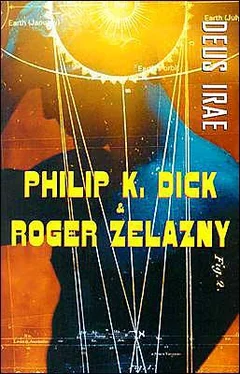“You are very modest,” Schuld said, “and more than a little naive. Do you think you were chosen simply because you were the best painter in town when the SOWs needed a murch? There is more to it than that. Would you believe that Charlottesville, Utah, was chosen to house the murch before it was your town? Would you believe that your town was chosen because you are the greatest artist alive today?”
Tibor turned and stared at him. “Father Handy never indicated anything like that,” he said.
“He gets his orders, as do those from whom he takes them.”
“You have lost me—again,” Tibor said. “How could you know these things?”
Schuld smiled and stared at him, head tilted upward, eyes half lidded, his face almost pulsing in the flame-light.
“Because I gave the first order,” he said. “I wanted you for my artist. I am the head of the Servants of Wrath, the temporal leader of the true religion of the Deus Irae.”
“My God!” said Tibor.
“Yes,” said Schuld. “For obvious reasons, I waited until now to tell you. I was not about to proclaim myself in front of Pete Sands.”
“Is Schuld your real name?” Tibor asked him.
“The name of a man differs in different countries. Schuld will do. I joined you at this point in your Pilg because I intend personally to see that you find the proper man. Pete will doubtless try to misdirect you. He has his orders, of course. But I will see to it that you are not misled. I will name Lufteufel, give you his form at the proper time. Nothing the Old Church can do will prevent it. I want you to be aware of this.”
“I felt there was something unusual about you,” Tibor said. Indeed I did, he thought. But not this. I know little of the hierarchical setup of the Servants of Wrath. Just that there is one. I had always assumed the murch represented a local decision in terms of ulterior decoration. It does make sense, though, when you think about it. Lufteufel is at the center of the religion. Anything involving him personally would warrant attention at the highest levels. And this man Schuld is the boss. If he were going to appear at all, this is the perfect time. No one else could have known, would have known, could have come up with that reason or effected this tuning. I believe him.
“I believe you,” Tibor said. “And it is somewhat—overwhelming. Thank you for your confidence in me. I will try to be worthy of it.”
“You are,” Schuld said, “which is why you were chosen. And I will tell you now that it may be a sudden thing, that I may have to arrange the encounter quite unexpectedly. Pete’s presence requires this. You must be prepared at any time from now on to record what I indicate, at a moment’s notice.”
“I will keep my camera ready,” Tibor said, activating his extensor and moving the device into a new position, “and my eyes, of course—they are always ready.”
“Good. That is all that I really require, for now. Once you have captured the image, neither Pete nor his entire church can take it away from you. The murch will proceed, as planned.”
“Thank you,” said Tibor. “You have made me happy. I hope that Pete does not interfere—”
Schuld rose and squeezed his shoulder.
“I like you,” he said. “Have no fear. I have planned everything.”
Stowing his gear, Pete Sands thought of Dr. Abernathy’s words, and he thought of Schuld, and of Carleton Lufteufel.
He cannot come out and tell me to kill Lufteufel, even though he knows that would solve our problem. He cannot even disregard Schuld’s intention in this direction, once he has heard of it. It is a damnable dilemma which cleaves all the way back to the basic paradox involved in loving everyone, even the carnifex about to poleax you. Logically, if you do nothing you die and he has his way. If you are the only one practicing such a philosophy, it dies with you. A few others—all right—he gets them, too, and it still dies. The noble ideal, caritas, passes from the world. If we kill to prevent this, though, we betray it. It gets Zen-like here: Do nothing and the destroyer moves. Do something and you destroy it yourself. Yet you are charged to preserve it. How? The answer is supposed to be that it is a divine law and will win out anyhow. I crack the koan simultaneously with an act of giving up on it. Then I am granted insight into its meaning. Or, in Christian terms, my will is empowered upon an especially trying occasion and I am granted an extraordinary measure of grace. I don’t feel any of it flowing this way at the moment, though. In fact, I begin to feel that I am beating my brains out against an impossible situation. I don’t want to kill Lufteufel, really. I don’t want to kill anybody. My reasons are not theological. They are just simple humanitarian things. I don’t like to cause pain. It may well be that if that poor bastard is still living, he has done a lot of suffering on his own already. I don’t know. I don’t care to know. Also, I’m squeamish.
Pete hefted his pack and moved on out of the glade.
With this, he thought as he walked, where is that car itas I am supposed to be practicing? Not too much of that around either. Can I love Carleton Lufteufel—or anyone—on such a plane that what they are, what they have done, counts for nothing? Where only the fact of existence is sufficient qualification as target for the arrow of this feeling? This would indeed be God-like, and is, I suppose, the essence of the ideal that we should strive to emulate the greater love. I don’t know. There have been occasions when I have felt that way, however briefly. What lay at their heart? Biochemistry, perhaps. Looking for ultimate causes is really an impossible quest. I remember that day, though, with Lurine. “What’s ein Todesstachel?” she had asked, and I told her of the sting of death and then oh God had felt it coming into my side piercing like a metal gaff twisting hooking oh Lord driving my body to an agonized Totentanz about the room Lurine trying to restrain me and up then looking along the pole from Earth to heaven ascending to the Persons then three who held me and into the eyes that saw oh Lurine the heart of my quest and your question there here and everywhere the pain never to cease and piercing the joy that is beyond and quickens as it slays again in the heart of the wood and the night oh Everyone I am here I did not ask to but I did—Ahead, he could make out the forms of Schuld and Tibor in the firelight. They were laughing, they seemed to be happy and that should be good. He felt something brush against his leg. Looking down, he saw that it was Toby. He reached out to pat the upturned head.
Alice held the doll, crooning to it, swaying. She rocked back and forth from one foot to the other. The corridor slanted gently before her. Squatting, she placed the doll on the truck. With a small push, she started it on its journey down the tunnel. She laughed as it sped away. When it struck the wall and turned over, she screamed.
“No! No! No! No!”
Running to it, she raised the doll and held it.
“No,” she said. “Be all right.”
She set the truck upright, reinstalled the doll.
“Now!” she said, pushing it again.
Her laughter followed it as it spun on its way, avoiding the obstacles which had collected in the corridor until it came to a crate filled with plastic tiles. When it struck there, the doll was hurled several feet and its head came off, to continue bouncing on down along the hall.
“No! No!”
Panting, she snatched up the body and pursued the head.
“Be all right,” she said when she had retrieved it. “Be all right.”
But she could not get the head to go back on again. Clutching them together, she ran to the room with the closed door and opened it.
Читать дальше








